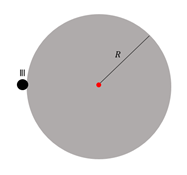This is equivalent to the area under the curve for an acceleration vs. time graph
What is change in velocity?
Reached when an object falling through the air is no longer accelerating.
What is terminal velocity?
The area under the curve of this graph gives you change in momentum.
What is F vs. t?
This formula can be used to calculate the moment of inertia of a solid object (hint: integral)
What is
intr^2dm
We use this law to obtain an expression for 'g'
What is Newton's Law of Universal Gravitation?
An object is moving with velocity given by v(t)=2t+3t2 where v is in m/s. The object travels this far in 5 seconds.
What is 150 m?
This principle states that when no net force acts on an object, its velocity remains constant.
What is "Newton's First Law of Motion" or "The Law of Inertia"?
This quantity, equal to mv, is conserved in a closed system when no external forces act.
What is "linear momentum" or "momentum"
"This rotational analog of mass is defined as the sum of mr² for all particles in a rigid body."
What is "moment of inertia" or "rotational inertia"?
This principle states that when two or more waves overlap, the resulting displacement at any point is the sum of the displacements of the individual waves
what is superposition?
TRUE OR FALSE: Kinematic equations can be used in conjunction with this graph. Give a brief reason to support your answer.
What is false? (Because acceleration isn't constant)
This is the magnitude of the normal force on a 2.0 kg block that is sliding down a frictionless inclined plane at 30°
What is 17.32 N
A frictionless roller coaster that starts at height 4h will be traveling this much faster when it reaches ground level than one that starts at height h.
What is 2 times as fast?
VIDEO QUESTION:
While in the air, the skier rotates about this point.
What is his center of mass?
A spring has a spring constant of 50 N/m, a length of 0.3 m, and a mass of 10 kg on it. This is the period of SHM for this system.
What is 2.81 s?
For a particle moving with position function x(t) = 3t³ - 6t² + 2, this time value corresponds to when the particle is momentarily at rest
What is 4/3 s
Draw a free body diagram for each of the three masses (frictionless table and system is accelerating together)
What is
When a 2 kg object moving at 5 m/s collides elastically with a stationary 3 kg object, this is the final velocity of the initially moving object.
What is -1 m/s?
A solid cylinder and a hollow cylinder of the same mass and radius roll down an incline without slipping. This cylinder reaches the bottom first
What is the solid cylinder?
A statement of Kepler's 2nd law
What is a line joining a planet to the Sun sweeps out equal areas in equal times. This means a planet travels faster when closer to the Sun (perihelion) and slower when farther away (aphelion).
A toy rocket is 5 m above the ground moving with velocity (2i + 3j) m/s when a screw comes loose. How long will it take to reach the ground?
What is 1.36 s?
This is the coefficient of kinetic friction between a block and a surface if the block, initially at rest, slides down a 25° incline with constant acceleration equal to 1/3 of the acceleration due to gravity.
what is 0.0985
In a perfectly inelastic collision between two objects with masses m and 2m moving at speeds 3v and v in opposite directions, this fraction of the initial kinetic energy is lost.
What is "8/9" or "approximately 89%"?
A glob of clay (mass m) falls down through the air and sticks to the edge of a uniform disk (mass M, radius R). If the disk is pivoted about its center and the clay was moving with speed v just before it hit the disk, this is the resulting angular velocity of the clay-disk system.

What is
(Rmv)/(1/2MR^2+mR^2)
Two parakeets sit on a swing with their combined CMs 10.0 cm below the pivot. This is the frequency at which they swing.
What is 1.58 s?